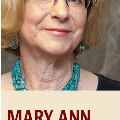BY MARY ANN STEINER
 Barely had Jesus called Peter and Andrew and the brothers Zebedee to leave their fishing nets behind when they gathered for a first meeting of apostles at the home of Peter. The least important person in that household — the old mother-in-law — ordinarily would have served the men some refreshment, but, as Peter explained to Jesus, she was ailing with a fever. Jesus healed her and she immediately got up to serve them. The evangelist Mark, who recounts this event, is known for his abbreviated versions of the gospel stories, but this is particularly terse even for him. Two sentences, no dialogue, done.
Barely had Jesus called Peter and Andrew and the brothers Zebedee to leave their fishing nets behind when they gathered for a first meeting of apostles at the home of Peter. The least important person in that household — the old mother-in-law — ordinarily would have served the men some refreshment, but, as Peter explained to Jesus, she was ailing with a fever. Jesus healed her and she immediately got up to serve them. The evangelist Mark, who recounts this event, is known for his abbreviated versions of the gospel stories, but this is particularly terse even for him. Two sentences, no dialogue, done.
The writer Joan Didion described her state of mind after losing her husband in a book she titled The Year of Magical Thinking. I would name the 12 months we've just lived through "The Year of Living Mutely." Beyond my lapses on Zoom ("Mary Ann, you're on mute!" or worse, "Mary Ann, mute yourself!"), I have felt, and often wanted to be, muted. I experience this in family and friends too. As much as we miss each other, some of us are hard-pressed to put words to what we're feeling, thinking or praying. I keep handing things up wordlessly, wondering if maybe later I will find the words.
The caregivers who are tending the sick, the dying, the families and each other during the pandemic often have been profoundly muted. Professionally, they adhere to all the protocols and PPE that make communication with patients and families so difficult; and there's so little time to rest and talk things over with colleagues. It has been even harder for them personally: what to tell the people who love you about the disease that could take you down; how many deaths you witnessed this week; how it feels to have your job on the line when you've already given so much; how close you are to cracking. Some of us were so moved by the nurse who explained this in a New York Times story, I thought you might want to see the video too: https://www.nytimes.com/video/opinion/100000007578176/covid-icu-nurses-arizona.html.
Just as Peter's mother-in-law got up to serve the new apostles after Jesus healed her from her illness, we know many caregivers serve their patients, residents or loved ones with brief recoveries from their own illnesses, traumatic events, exhaustion and anxieties. We don't know the mother-in-law's motive or her expectation, only that she did it. Just as we don't know as much as we should about the caregivers who are there for us in emergency departments, eldercare facilities, urgent care clinics, intensive care units, mental health crisis centers, and in the home care the people who love them give frail elderly, severely disabled or people with dementia. We do know they are there when we need them.
This issue of Health Progress explores how to take better care of the caregivers who fulfill the mission of Catholic health care. We have tried to unmute the conversations that need to take place about overly stressful working conditions and relief for caregivers in terms of regular breaks, respite spaces and channels to express frustrations and requests for help. There are important suggestions about self-care, but also a recognition that self-care only works when it is supported with strategic institutional commitment. In the pages that follow there are wonderful examples of how some of our members are doing exactly this: moving beyond recognition and gratitude to system-wide strategies to hear, respond and put firmly in place best practices for caring for their caregivers.
At this point in the Editor's Note, I usually thank the authors who have provided the articles that raise important topics and expand our understanding. While I do that most gratefully here, let me also thank the many authors I've worked with over the years: so generous and insightful and courageous when offering honest critiques to the ministry they love and represent. I will be retiring from CHA at the end of April, so this is my last opportunity to write these things to you. Let me just tell you this: I have loved preparing these issues of Health Progress for the people of Catholic health care, and I have treasured your companionship along the way. Godspeed, I will miss you.